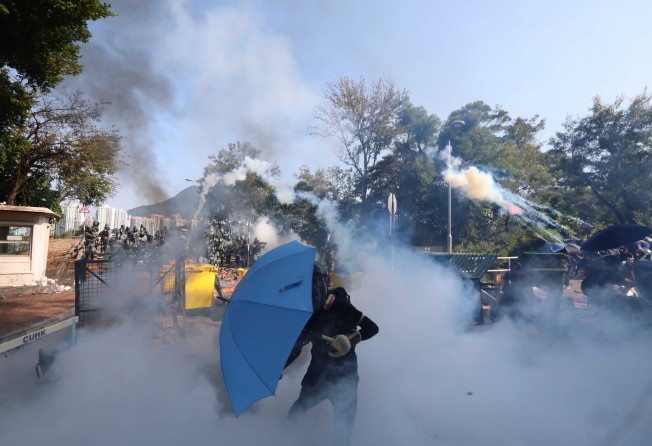Hong Kong stocks see worst fall in three months as protester is shot, man set on fire
- Hang Seng benchmark fell 2.6 per cent, while the Shanghai Composite Index dropped 1.8 per cent
- City says it has no plans to suspend stock trading or impose curbs on cash withdrawals at banks

Hong Kong stocks suffered their worst fall in three months on Monday, as anti-government protests turned into horrifying scenes, including a man being set on fire.
A college-aged protester was shot and petrol bombs were thrown into a subway train with passengers in a day that spun from one shocking scene to another in a city long known for its safety and efficiency.
The Hang Seng Index fell 2.6 per cent to 26,926.55, with only one of the 50 constituent stocks posting a gain. It had risen 8 per cent over the past month to close at 27,651.14 points on Friday, setting off technical warnings that it was in overbought territory.
Meanwhile, with rumours circulating on social media, the city’s government felt it necessary to say there were no plans to suspend stock market trading or impose restrictions on cash withdrawals from banks.
China stocks also suffered losses, on fears of rising inflation as pork prices surge and scepticism that Washington and Beijing are making progress in solving their trade war that is partly to blame for China’s slowing economy.
The Shanghai Composite Index dropped 1.8 per cent to 2,910. That was its worst fall in four months, when on July 8 it fell 2.58 per cent. The Shenzhen Composite Index fell 2.26 per cent to 1,611.45. That was its worst fall since September 26, when it dropped 2.51 per cent.
“China and Hong Kong equity markets were perhaps lucky to have fallen only this far,” said Brock Silvers, managing director of Adamas Asset Management in Hong Kong.
“Investors are realising that a trade deal may not be as close as thought. China’s factories just reported lower prices for the fourth consecutive month as the slowdown deepens. And social instability in Hong Kong has reached a new peak today with multiple shootings and violence,” he said.
The three heavyweights on the Shanghai benchmark all closed with losses.
The Industrial and Commercial Bank of China fell 1.7 per cent to 5.77 yuan, Kweichow Moutai dropped 0.5 per cent to 1,199 yuan, and the Agricultural Bank of China declined 1.7 per cent to 3.55 yuan.
Gauges tracking sectors saw broad losses, with liquor stocks down 1 per cent, blockchain-linked stock falling 2 per cent and wireless headset makers slipping 0.3 per cent. Luxshare Precision Industry, the main assembler of AirPods – fell 0.8 per cent gain to 34.18 yuan.
China’s consumer prices rose to a near eight year high in October, the government reported over the weekend, climbing 3.8 per cent.
“We expect Chinese (Consumer Price Index) will rise to 4 or even 5 per cent before Chinese New Year,” said Kenny Wen, wealth management strategist at Everbright Sun Hung Kai.
The losses in Hong Kong and China came even as Alibaba broke last year’s Singles’ Day record with 213.5 billion yuan worth of sales in 16.5 hours. (Alibaba is the parent company of the South China Morning Post.)
In Hong Kong, MTR fell 3.1 per cent to HK$43.65, as the city’s subway owner and operator continues to see its shares hammered amid anti-government violence.
The Hang Seng’s three heavyweights all fell.
Insurer and financial services provider AIA dropped 3.4 per cent to HK$79.60, HSBC slid 0.9 per cent to HK$59, while Tencent, the Chinese internet giant that reports third quarter results on Wednesday, lost 1.3 per cent to HK$323.
Property stocks were big losers.
Sun Hung Kai Property fell 4.3 per cent to HK$112, Wharf Real Estate Investment dropped 4.5 per cent to HK$44.35, New World Development tumbled 4.2 per cent to HK$11.02, while Swire Pacific fell 5.2 per cent HK$72.65.
“Hong Kong’s escalating protests could pose serious threats to public safety and turn up the risks to developers’ earnings with possible double-digit rental declines for both prime office and retail rents in 2020,” Bloomberg Intelligence analysts wrote in a new note.
“Massive protests with tear gas fired by the police during lunchtime in the Central district could prompt some multinational tenants to spread their office space across Hong Kong, or even relocate portions of their workforces elsewhere in the Asia-Pacific region. Tenants’ sales at prime shopping malls are likely to slump in 4Q given the increased number of violent attacks on retailers in various districts. The slump in visitor arrivals from mainland China following weeks of unrest will continue to crush hotel occupancy rates and retail leasing in major tourist districts,” the analysts wrote.
On the Hang Seng Index, only CSPC Pharmaceutical Group closed with gains, rising 0.5 per cent to HK$21.05.
Among other stocks, CK Life Sciences was among the day’s winners, picking up 2 per cent to HK$1.02 after sliding Friday following two days of more than 200 per cent gains on news of progress in clinical trials of its skin cancer vaccine.
Beigene rose 1.8 per cent to HK$116.60. American biotech major Amgen agreed to buy BeiGene shares equivalent to a 20.5 per cent stake for US$2.7 billion, BeiGene said in an exchange filing on October 31.
Louis Tse Ming-kwong, managing director of VC Asset Management, said the Hang Seng fell below its 250-day moving average.
“So there’s plenty of chances of going down further,” Tse said.
Additional reporting by Snow Xia